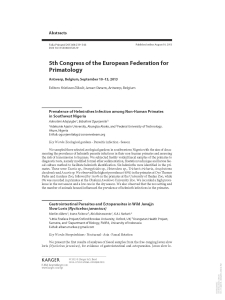Haurez B., Petre C.A., Doucet J.L.
Timber exploitation is expanding within the forests of the Congo Basin. In Gabon, the timber industry is currently the second largest working sector, and logging concessions cover 45% of the country’s forest area, largely overlapping with the range of the western lowland gorilla ( Gorilla gorilla gorilla , WLG). With respect to its large body size, long gut retention time and extended daily path length, WLG presents a great potential for seed dispersal compared to other African primates. As this species disperses seeds of variable size preferentially into open canopy habitats such as old logging roads and gaps, WLG may contribute significantly to the recovery of logged forests. However, its effectiveness in ecological processes governing logged forest dynamics and forest regeneration is still poorly known. In the present study, seed dispersal by WLG was studied in a 617,000-ha logging concession located in Central Gabon. WLG-dispersed seeds were identified through faecal analysis followed by germination trials to assess seed viability after gut passage. For the most abundant species, impact of gut passage on seed germination was assessed through comparative germination trials. Our 10-month study revealed that WLG dispersed seeds of 45 plant species. Seed viability was assessed for 36 taxa, with germination success ranging from 0 to 100%. For the most represented taxon, Santiria trimera , in gorilla faeces in the period January to March, seeds passed in gorilla gut displayed significantly higher germination success than those extracted from fresh fruit or sown surrounded by pulp. The preliminary results of this longterm study suggest that gorillas disperse many different plant species and could be effective dispersers for most of them.
Consultez la notice complète de l’article sur ORBi

